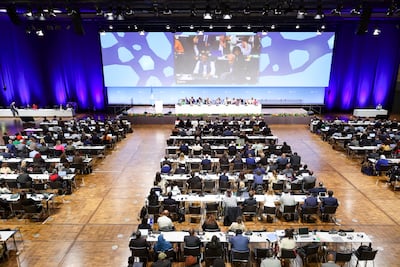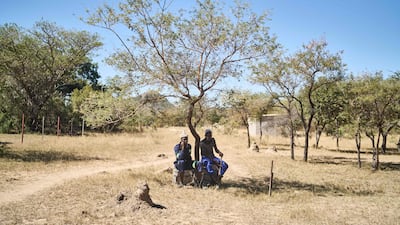Jim Skea, the world’s most senior climate scientist, showed four slides to diplomats on Tuesday revealing “what we know” and “what we need to know”.
Much of the “know” column is familiar by now – we are heading for more than 1.5ºC of global warming, causing irreversible damage to the Earth, unless we move fast.
The “need to know” section includes studying what is sometimes called the ‘plan B’ of overshooting 1.5ºC then trying to claw temperatures back down.
It is feared that runaway global warming could blunt our ability to fight it, for example by ruining land that was meant to be given over to nature.
These are some of the "very significant knowledge gaps that science needs to work on”, Prof Skea said at the first formal UN climate talks since Cop28 in the UAE.
In his slides there also lurks a key question for the 195 governments meeting in Germany this week to discuss their green plans – what will be their social and economic ripple effects?

Just transition
Virtually everyone involved in the talks at UN climate headquarters in Bonn agrees net-zero policies will be a non-starter if they are seen as socially or economically unfair.
The term in UN jargon for what is wanted is a "just transition".
A set of meetings known as the UAE Just Transition Work Programme is taking place to address exactly that issue, building on what was agreed at Cop28 in Dubai.
“Just transition is not just about reducing carbon emissions – it’s about building a future where social and economic sustainability go hand in hand,” said Pakistan’s Nabeel Munir, one of those chairing of the talks.
The deal struck at Cop28, known as the UAE Consensus, included a commitment to “transitioning away” from fossil fuels and making vastly more clean energy available.
It is now up to all 195 parties to draw up new green plans at a national level, by 2025 at the latest, taking the Dubai pledges into account.
Prof Skea, the British head of the UN science panel known as the IPCC, told delegates that green action has “more synergies than trade-offs” with global anti-poverty goals.
He said scientists sketching out a just transition saw good jobs, retraining, fair energy access, investment in new technology and social and democratic dialogue as key elements.

Africa, for example, should benefit from the green rush by producing the materials key to clean technology, lobbyist Mithika Mwenda from Kenya said.
“For us, a graceful transition is very important,” the executive director of the Pan African Climate Justice Alliance told The National.
“Look at the African continent for the minerals which are driving the transition. Lithium in [the Democratic Republic of Congo], cobalt, copper and all these are worth trillions and trillions of dollars.”
However, the “equity, justice and distributional impacts” of climate action are one of Prof Skea’s unknowns.
“There’s a need for increased research on the synergies and trade-offs of climate action and of sustainable development,” said negotiator Cheryl Jeffers of St Kitts and Nevis.
“Just transitions do require a greater understanding of the unique climate impacts and the policies that would help us to minimise any sort of risks associated with the loss of livelihoods.”
At the same time, concerns have been raised about mixing science with political decision-making and countries are warned that stalling on clean energy may not help them economically.
The risks include countries “being left behind in a new innovation era”, said Sonia Seneviratne of the Swiss Federal Institute of Technology Zurich.

Prof Skea’s “need to knows” also include how the Earth’s biosphere would respond to a world in which CO2 is removed from the atmosphere in a last-ditch bid to save the planet.
He said it may not be as simple as “retracing our steps” and more research was also needed on which effects are reversible.
Finance push
The question of raising finance for climate policies is overshadowing the Bonn talks and is also expected to dominate Cop29 in Baku.
African delegates warned of “ballooning costs” of dealing with climate-related hazards while small island states are pushing for a new funding pledge higher than a previous $100 billion.
“We remain steadfast on our numerous calls for a climate finance goal to be centred on the provision of public finance by developed countries,” Mr Mwenda said.
“We are, however, alarmed by the attempts by those who bear the biggest responsibility on the climate crisis to transfer the burden of action to the victims of their actions.”
The UAE’s Cop28 presidency, meanwhile, announced a new task force to help farmers tackle climate threats.
Building on a 159-country pledge on agriculture that emerged from Cop28, it will focus on helping developing and climate-vulnerable countries switch to sustainable farming methods.
Cop28 President Dr Sultan Al Jaber separately called for advances in AI to be used to accelerate “climate positive” development.
Speaking at Baku Energy Week in Azerbaijan, he said AI was driving a surge in energy demand and “efficiencies that curb emissions”.
“The closer AI and energy collaborate, the more solutions we can unlock to drive decarbonised growth everywhere.”


